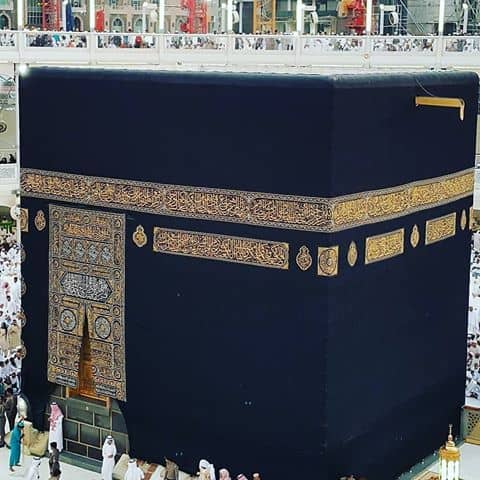
The Story of Prophet Ibrahim (AS)

In religion, Islam Allah Almighty sent many Prophets in this world for the guidance of mankind almost 25 are mentioned in the Holy Quran. One of them is Prophet Ibrahim (AS) a very important Prophet in religion Islam. Prophet Ibrahim (AS) is greatly associated with Hajj because the origin of Hajj is as old as the Kaaba, which was built by Ibrahim (AS) and his son Ismail (AS). Every act of Hajj reminds Muslims about the noble family of Ibrahim (AS). Every act of Hajj refers back to the righteous actions and struggle of either Ibrahim (AS), his wife Hajrah or his son Ismail (AS).
Prophet Ibrahim (AS) lived in a time, long before the time of Prophet Muhammad (SAW). When He was young boy He used to watch people who worship idols and considering them their gods. Prophet Ibrahim (AS) was very clever and intelligent He (AS) always used to ask questions about things that happen around him. Ibrahim (AS) could not believe that anyone could consider these idols, made of stone to be their gods and worship them. Prophet Ibrahim (AS) was confused and one day He (AS) told his father He didn’t think people should worship objects they had made themselves. His father was angry and told him not to say anything about the gods again.
Prophet Ibrahim (AS) decided to show the people they were wrong so He (AS) made a plan. One night Prophet Ibrahim (AS) sneaked into the place where all the statues were kept. He (AS) chopped off the heads of all statues with an Axe but left the biggest one and hung the Axe around the neck of the big idol and then went away. Next morning when people returned they were shocked, “What happened to our Idols?” they thought about it. They discussed it for a while and concluded that Ibrahim (AS) would know because He (AS) was known to speaking out against their idols. When they asked Ibrahim (AS) whether He (AS) did this act of breaking of their idols He (AS) told them that it was the biggest ‘God’ statue to have done it as he held the Axe on his shoulder. Despite that the people realized that the idols were not able to speak, their foolishness led to decide to burn Ibrahim (AS).

The foolish people chained Ibrahim (AS), dug a deep hole, filled it with firewood and lit an intense fire and decided to throw Him in the fire. Before throwing Prophet Ibrahim (AS) in, Angel Jibrail came close to his head and asked him whether He (AS) wished for something then Ibrahim (AS) said that He only wanted Allah (SWT) to be pleased with him. Ibrahim (AS) was thrown into the fire, at that moment Allah (SWT) ordered the fire to be cool for him. The fire obeyed and Ibrahim (AS) came out unharmed. Still, the foolish people denied Allah’s (SWT) miracle.
After this incident, Prophet Ibrahim (AS) moved away and got married to a lady named Sarah. They lived happily for a long time. However, there was some heartache in Ibrahim (AS) and Sarah’s life. They had been happily married for so long and Allah had not granted them any children. Sarah knew that Ibrahim (AS) was eager for a child but she was getting old and may not be able to give him a child. She suggested to Ibrahim (AS) that he should marry Hajrah, their slave girl, and maybe Allah would bless them with a child through her. Prophet Ibrahim (AS) accepted the advice of his beloved wife Sarah and married Hajrah. It wasn’t long before Ibrahim (AS) and Hajrah were blessed with a baby boy whom they named Ismail.
After sometime Sarah became jealous of Hajrah and Ismail (AS). She told Ibrahim (AS) to take the child and mother to a land far away from them. Ibrahim (AS) then decided to take them to a place in Hijaz, which was a dry, mountainous and barren land. Here Ibrahim (AS) left Hajrah and Ismail (AS) under the shade of a lofty tree, near the hills of Safa and Marwa. This place had very little vegetation and had no water. Ibrahim (AS) left some food with Hajrah and a pouch of water. After some time both the food and water ran short and Ismail (AS) began to cry. Hajrah was scared and she started ran between the hills of Safa and Marwa looking for food or water but could not find anything. She ran between the two hillocks seven times. After the hectic search, she returned and found a spring had appeared where Ismail (AS) was kicking the sand with his feet. This spring, called Zamzam producing clean water and Hajrah and Ismail (AS) drank from it.
After many years, Ibrahim (AS) returned to Makah to see his son a grown man. He learned that Hajrah had passed away in his absence. Allah wanted to test Ibrahim’s submission again in a dream; the Prophet Ibrahim (AS) was instructed to sacrifice his son Ismail (AS) to Allah. Ibrahim (AS) told his son Ismail (AS) about the dream, and both agreed to submit to the will of Allah (SWT). Ismail (AS) lay prostrate with his forehead touching the ground, while his father laid a sharp knife upon his neck. At that moment, Allah Almighty called down: “O Ibrahim! You have done my bidding and now you will be rewarded!” A large ram appeared as an alternative sacrifice, and instead of killing his son, Ibrahim (AS) slaughtered the sheep to the glory of Allah Almighty.
After that Allah (SWT) ordered Ibrahim (AS) to build a house for the worship of Almighty Allah. He (AS) then went to his son, Ismail (AS) for some help. They both set the foundation of the Kaaba using a rock that came from Heaven. Today, this rock is found in the core of the Kaaba, known as the black stone. They started to build it and when the walls became high, Ismail (AS) brought a stone for his father who stood over it. This stone was called the Makah-e-Ibrahim. The Kaaba was finished and everyone worshipped there. The Kaaba is known as the house of Allah. Prophet Ibrahim (AS) then asked the tribes to make the pilgrimage to this house of Allah the Holy Kaaba.
Every year, millions of Muslims from all over the world travel to Makah to circle the Kaaba that Ibrahim (AS) and Ismail (AS) built and run between the two hills Marwa and Safa, just like Hajrah did. We also observe the obedience of the Prophet Ibrahim (AS) by sacrificing an animal on their behalf and distribute the meat among poor people.




